European Voices in Translation (05/10/14)
The Center for the Study of Europe, in collaboration with the Goethe Institut Boston and the literary journal AGNI, announces the first annual European Voices Festival: European Voices in Translation. Join us for a day of poems, prose, theater, and music in celebration of “Europe Day.”
Schedule of Events
1 PM – A Reading and Conversation with László Krasznahorkai and George Szirtes | Moderated by James Wood
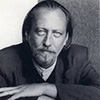 Widely recognized as one of the very best and important novelists of our time, László Krasznahorkai was born in Gyula, Hungary, in 1954. He worked for some years as an editor until 1984, when he became a freelance writer. He now lives in reclusiveness in the hills of Szentlászló. He has written five novels and won numerous prizes, including the 2013 Best Translated Book Award in Fiction for Satantango. Previously, he was best-known in the English-speaking world through the oeuvre of the film director Béla Tarr, with whom he has collaborated on several films over three decades, including the adaptation of several of his own novels. [Author website]
Widely recognized as one of the very best and important novelists of our time, László Krasznahorkai was born in Gyula, Hungary, in 1954. He worked for some years as an editor until 1984, when he became a freelance writer. He now lives in reclusiveness in the hills of Szentlászló. He has written five novels and won numerous prizes, including the 2013 Best Translated Book Award in Fiction for Satantango. Previously, he was best-known in the English-speaking world through the oeuvre of the film director Béla Tarr, with whom he has collaborated on several films over three decades, including the adaptation of several of his own novels. [Author website]
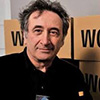 George Szirtes was born in Budapest in 1948 and came to England as a refugee in 1956. He was brought up in London and studied Fine Art in London and Leeds. His poems began appearing in national magazines in 1973 and his first book, The Slant Door, was published in 1979. It won the Faber Memorial prize the following year. Szirtes has also worked extensively as a translator of poems, novels, plays and essays and has won various prizes and awards in this sphere, including the 2013 Best Translated Book Award for his translation of László Krasznahorkai’s Satantango. [Author website]
George Szirtes was born in Budapest in 1948 and came to England as a refugee in 1956. He was brought up in London and studied Fine Art in London and Leeds. His poems began appearing in national magazines in 1973 and his first book, The Slant Door, was published in 1979. It won the Faber Memorial prize the following year. Szirtes has also worked extensively as a translator of poems, novels, plays and essays and has won various prizes and awards in this sphere, including the 2013 Best Translated Book Award for his translation of László Krasznahorkai’s Satantango. [Author website]
 James Wood has been a staff writer and book critic at The New Yorker since 2007. He was the chief literary critic at the Guardian, in London, from 1992 to 1995, and a senior editor at The New Republic from 1995 to 2007. His critical essays have been collected in two volumes, “The Broken Estate: Essays on Literature and Belief” (1999) and “The Irresponsible Self: On Laughter and the Novel” (2004), which was a finalist for the National Book Critics Circle Award. He is also the author of a novel, “The Book Against God” (2003), and a study of technique in the novel, “How Fiction Works” (2008). He lives in Boston, and teaches half time at Harvard University, where he is Professor of the Practice of Literary Criticism.
James Wood has been a staff writer and book critic at The New Yorker since 2007. He was the chief literary critic at the Guardian, in London, from 1992 to 1995, and a senior editor at The New Republic from 1995 to 2007. His critical essays have been collected in two volumes, “The Broken Estate: Essays on Literature and Belief” (1999) and “The Irresponsible Self: On Laughter and the Novel” (2004), which was a finalist for the National Book Critics Circle Award. He is also the author of a novel, “The Book Against God” (2003), and a study of technique in the novel, “How Fiction Works” (2008). He lives in Boston, and teaches half time at Harvard University, where he is Professor of the Practice of Literary Criticism.
2:30 PM – Break
3 PM – Staged reading from German play Brandung/Abyss and Conversation with Playwright and Translator Maria Milisavljevic and German Stage Director Guy Ben-Aharon
Karla is missing. Vlado, Sophia, and Sophia’s sister – the play’s narrator – leave the safety of their apartment to search for their missing friend. As their story slowly unravels, it becomes clear that the narrator isn’t as reliable as she seems and Vlado has been keeping a secret.
 Born in Arnsberg, Germany, Maria Milisavljevic is an award-winning playwright, theatre creator and director. Her latest play Brandung (Abyss) received the 2013 Kleist Promotional Award for Young Dramatists and is currently showing at the Deutsches Theater Berlin. Maria has worked with various theatres and companies across Germany and in London’s West End. She is currently the International Playwright-in-Residence at Tarragon Theatre in Toronto.
Born in Arnsberg, Germany, Maria Milisavljevic is an award-winning playwright, theatre creator and director. Her latest play Brandung (Abyss) received the 2013 Kleist Promotional Award for Young Dramatists and is currently showing at the Deutsches Theater Berlin. Maria has worked with various theatres and companies across Germany and in London’s West End. She is currently the International Playwright-in-Residence at Tarragon Theatre in Toronto.
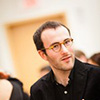 Stage Director, Producer and Cultural Entrepreneur Guy Ben-Aharon was born in Israel. The founder of Israeli Stage and co-founder of German Stage, his passion and work is to promote international theatre and cultural bridges in the Greater Boston area.
Stage Director, Producer and Cultural Entrepreneur Guy Ben-Aharon was born in Israel. The founder of Israeli Stage and co-founder of German Stage, his passion and work is to promote international theatre and cultural bridges in the Greater Boston area.
3:45 PM – Break
4 PM – A Reading and Conversation with Semezdin Mehmedinovic and Ammiel Alcalay | Moderated by Ainsley Morse
 Semezdin Mehmedinovic is a Bosnian journalist, poet, editor, and filmmaker. His poetry collection Sarajevo Blues (published in English translation by Ammiel Alcalay in 1998) was praised by the Washington Post as one of the best literary documents of the Bosnian war. A later collection, Nine Alexandrias (translated by Alcalay and published by City Lights in 2003), was written in response to a cross-country train trip across post 9/11 America and to twenty-first century life in the heart of the empire. Soviet Computer (2011) is a diary of his migration from Sarajevo to Prague and eventually Washington, DC.
Semezdin Mehmedinovic is a Bosnian journalist, poet, editor, and filmmaker. His poetry collection Sarajevo Blues (published in English translation by Ammiel Alcalay in 1998) was praised by the Washington Post as one of the best literary documents of the Bosnian war. A later collection, Nine Alexandrias (translated by Alcalay and published by City Lights in 2003), was written in response to a cross-country train trip across post 9/11 America and to twenty-first century life in the heart of the empire. Soviet Computer (2011) is a diary of his migration from Sarajevo to Prague and eventually Washington, DC.
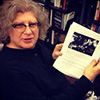 Ammiel Alcalay teaches at Queens College and the CUNY Graduate Center. He is the author of numerous books, including After Jews and Arabs: Remaking Levantine Culture (Minnesota) and an essay collection, Memories of Our Future (City Lights). Islanders, a novel, came out in 2010. His book length poem, from the warring factions, dedicated to the Bosnian town of Srebrenica, came out in a 2nd edition in 2012, followed by a little history in 2013. He has translated widely and, during the wars of ex-Yugoslavia, he was the main conduit in the US for material from Bosnia. He is the founder and General Editor of Lost & Found: The CUNY Poetics Document Initiative, and Lost & Found Elsewhere, a series of student and guest edited archival texts now in its fifth year.
Ammiel Alcalay teaches at Queens College and the CUNY Graduate Center. He is the author of numerous books, including After Jews and Arabs: Remaking Levantine Culture (Minnesota) and an essay collection, Memories of Our Future (City Lights). Islanders, a novel, came out in 2010. His book length poem, from the warring factions, dedicated to the Bosnian town of Srebrenica, came out in a 2nd edition in 2012, followed by a little history in 2013. He has translated widely and, during the wars of ex-Yugoslavia, he was the main conduit in the US for material from Bosnia. He is the founder and General Editor of Lost & Found: The CUNY Poetics Document Initiative, and Lost & Found Elsewhere, a series of student and guest edited archival texts now in its fifth year.
 Ainsley Morse’s major interest is twentieth-century Russian poetry, although since she started off with a master’s in Comparative Slavic literatures from UNC-Chapel Hill (where she focused on twentieth-century Serbian and Yugoslav literature), she does her best to keep a foot in the Yugoslav door. She has recently been having a fine time with the phenomenal Yugoslav avant-garde, with special attention to Miroslav Krleza. In studying poetry, Ainsley is partial to close readings combined with a literary-historical approach, with attention to social relations and genealogies, real and imagined.
Ainsley Morse’s major interest is twentieth-century Russian poetry, although since she started off with a master’s in Comparative Slavic literatures from UNC-Chapel Hill (where she focused on twentieth-century Serbian and Yugoslav literature), she does her best to keep a foot in the Yugoslav door. She has recently been having a fine time with the phenomenal Yugoslav avant-garde, with special attention to Miroslav Krleza. In studying poetry, Ainsley is partial to close readings combined with a literary-historical approach, with attention to social relations and genealogies, real and imagined.
5:30 PM – Break
6:00 PM – A Reading from Bohumil Hrabal’s Harlequin’s Millions in English translation (Archipelago Books, May 2014) by Stacey Knecht.
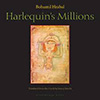 Bohumil Hrabal (1914 – 1997) was one of the most important Czech writers of the 20th century. He wrote in colloquial Czech and is famous for his acute observations and charismatic antiheros. His best-known works were I Served the King of England (1971) and Closely Observed Trains (1965), a film of which won an Oscar in 1968. Harlequin’s Millions (1981), soon to be published in English translation by Stacey Knecht, told from the point of view of an elderly woman coming to terms with the passing of time, gives us a glimpse into the changing landscape of Hrabal’s homeland. [Publisher’s website]
Bohumil Hrabal (1914 – 1997) was one of the most important Czech writers of the 20th century. He wrote in colloquial Czech and is famous for his acute observations and charismatic antiheros. His best-known works were I Served the King of England (1971) and Closely Observed Trains (1965), a film of which won an Oscar in 1968. Harlequin’s Millions (1981), soon to be published in English translation by Stacey Knecht, told from the point of view of an elderly woman coming to terms with the passing of time, gives us a glimpse into the changing landscape of Hrabal’s homeland. [Publisher’s website]
 A native New Yorker, Stacey Knecht lives in the Netherlands. Her translations from the Dutch, including Hugo Claus’s Desire; Marcel Moring’s The Dream Room, The Great Longing, and In Babylon; Anke de Vries’s Bruises; Lieve Joris’s Back to the Congo; and Marga Minco’s The Glass Bridge have won awards in the US and the UK. She is currently translating an anthology of Hrabal’s short stories.
A native New Yorker, Stacey Knecht lives in the Netherlands. Her translations from the Dutch, including Hugo Claus’s Desire; Marcel Moring’s The Dream Room, The Great Longing, and In Babylon; Anke de Vries’s Bruises; Lieve Joris’s Back to the Congo; and Marga Minco’s The Glass Bridge have won awards in the US and the UK. She is currently translating an anthology of Hrabal’s short stories.
6:20 PM – A reading of selected poems by Ivan Blatný in English translation by Veronika Tuckerova
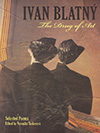 Lost to the world for decades, Ivan Blatný was, according to the Czech Ministry of Culture, “one of the most significant Czech poets of the twentieth century.” Blatný fled Czechoslovakia after the Communist coup in 1948, spending the rest of his life in England. The Drug of Art: Selected Poems, edited by Veronika Tukerova, spans fifty years of his career and is notable for being the first major collection of Blatný’s work in English.
Lost to the world for decades, Ivan Blatný was, according to the Czech Ministry of Culture, “one of the most significant Czech poets of the twentieth century.” Blatný fled Czechoslovakia after the Communist coup in 1948, spending the rest of his life in England. The Drug of Art: Selected Poems, edited by Veronika Tukerova, spans fifty years of his career and is notable for being the first major collection of Blatný’s work in English.
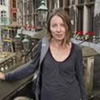 Veronika Tuckerova grew up in Prague, and holds a Ph.D. in German and Comparative Literature from Columbia University in New York. Her research focuses on Franz Kafka and Prague German Literature, bilingualism, and translation. Among her translations from German to Czech is Gershom Scholem’s memoir, From Berlin to Jerusalem. She is working on a book, Reading Kafka in Prague during Communism.
Veronika Tuckerova grew up in Prague, and holds a Ph.D. in German and Comparative Literature from Columbia University in New York. Her research focuses on Franz Kafka and Prague German Literature, bilingualism, and translation. Among her translations from German to Czech is Gershom Scholem’s memoir, From Berlin to Jerusalem. She is working on a book, Reading Kafka in Prague during Communism.
6:45 PM – Break
7 PM – Intertwined Musical Voices: Biber, Buxtehude, and Bach | A concert performance by Cambridge Concentus
Early-music ensemble Cambridge Concentus will perform a short program of works for soprano, bass, violins, and harpsichord by Baroque composers Heinrich Biber, Dietrich Buxtehude, and JS Bach. Biber and Buxtehude were highly revered in their time and profoundly contributed to the genres for which Bach is most known today. Concentus provides a tantalizing glimpse of these composers’ intertwined musical voices.
J.S. Bach
Prelude, Fugue and Allegro in Eb Major for Solo Harpsichord BWV998D. Buxtehude (1637-1707)
“Herr, wenn ich nur dich hab” for Soprano, Violins, and Harpsichord, BuxWV38H. Biber (1644-1704)
Passagalia in G Minor for Solo Violin
XVI from the Mystery SonatasD. Buxtehude
“Quemadmodum desiderat cervus: Chiaccona a3” for Bass, Violins, Harpsichord, BuxWV92J.S. Bach (1685-1750)
Sonata for Violin and Harpsichord in G Major, BWV1021J.S. Bach
“Komm Mein Jesu und erquicke” for Soprano, Bass, and Harpsichord
from Ich hatte viel Berkümmernis, BWV21
Ulrike Präger, soprano
Elijah Blaisdell, bass
Dorian Komanoff Bandy, violin
Anna Griffis, violin
Dylan Sauerwald, harpsichord
8 PM – Reception
This event take place at the Goethe Institut Boston, 170 Beacon Street, Boston, MA. The public is cordially invited. General Admission $10. Students free with university id. [Ticket info]
